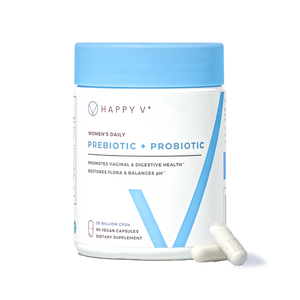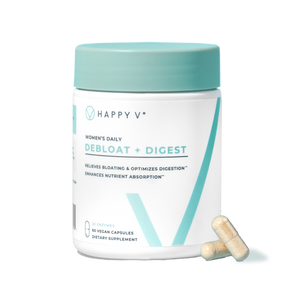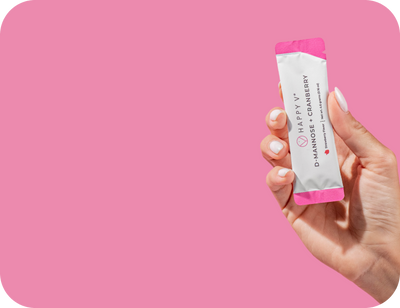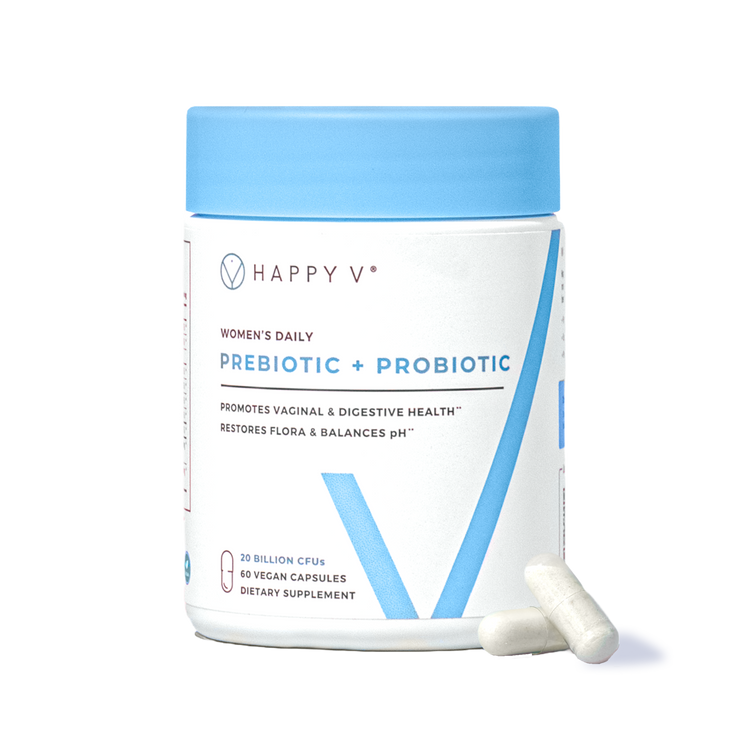- Fact Checked
- May 31, 2025
- 7 min read
The Impact of Sugar on Vaginal Health
Table of Contents
Table of Contents
What you eat affects almost every single part of your body. To put it into perspective, our gut is home to trillions of microbes. Some of them are bad for your health while mostly are good for your overall health.
Good bacteria in your gut are responsible for strengthening your immune system, aiding in digestion of indigestible foods, and protecting your body from bad bacteria too. They also help your body to synthesize vitamins and amino acids. These good microbes fight off bad bacteria, however, unhealthy eating habits can affect the composition of microbes in your gut. Ultimately, the composition of your vaginal microbiome also gets disturbed. (1)
Foods rich in carbs, sugars and processed foods that are loaded with artificial sugars dramatically change your microbial balance. Basically, when you eat excessive processed sugars and fats, your blood sugar level spikes up. Bad bacteria and yeasts feed on this excessive sugar and grow uncontrollably. Secondly, high blood sugar levels also suppress your immunity. With suppressed immunity and increased disease-causing microorganisms, your chances of getting vaginal infections are doubled.
This post is for informational purposes only and does not constitute medical advice. See full disclaimer below.
How can your diet impact your vagina’s health?
Eating high amounts of sugars, especially artificial sugars, fats or eating high energy diets puts you at risk of developing health problems. Most importantly, such foods provide feeding grounds to bad disease-causing bacteria and yeasts. When bad bacteria and yeasts content increases it leads to an imbalance in the vaginal flora.
The way it works in the body is that when bad bacteria outgrow the naturally dominant lactobacilli, this ultimately causes bacterial vaginosis or BV and vaginal yeasts infections such as Candidiasis Albicans to appear.
Can too much sugar cause vaginal yeast infections?
Unfortunately, the answer is ‘yes’. This is because when you eat sugar containing foods, excess sugars end up in your blood. When this blood flows through the body, especially vagina, bad yeasts feed on it. They grow in significant numbers causing vaginal yeast infections. However, there are other causes too but if your yeast infection is recurring then sugar is one of the major culprits.
According to the CDC, Yeast infections are the second most common vaginal infections in the US. They are caused when C. albicans – an infection causing yeast to grow in abundance.
It resides in your vagina naturally and when you eat excessive sugars or fats, it feeds on them. Its uncontrolled growth leads to vaginal yeast infection called — “vaginal candidiasis,” “vulvovaginal candidiasis,” or “candidal vaginitis”. (2)
Symptoms associated with vaginal infections are:
- Thick, cottage cheese like discharge
- Usually without any odor or mild odor
- Burning and itching around vaginal area
According to webMD, common causes of vaginal yeast infections are include hormonal imbalances, excessive sugar intake and even uncontrolled diabetes.
Vaginal yeast infections are treated by using topical antifungals such as Fluconazole, making some healthy changes to your lifestyle and taking preventive measures. (3,4)
Can too much sugar cause BV?
Researchers have evaluated that high intake of carbs, sugar and fats are associated with an increased risk of BV.
Secondly, eating too much sugar suppresses your immune system. Bad bacteria find it as an opportunity and feed on sugars to outnumber good ones. Therefore, we can conclude that eating too much sugar puts your natural defense down. Once your defense goes down, your risk of getting BV increases significantly. (5)
Here’s what Centers for Disease Control and Prevention has to say about BV – It is the most common vaginal infection in women of reproductive age (14–44). BV or Bacterial Vaginosis is an imbalance between good bacteria and bad bacteria.
Normally your vagina is home to Lactobacilli species. These species are responsible for the production of lactic acid and hydrogen peroxide. The vaginal pH of less than 4.5 is maintained by these good bacteria.
Women with BV have increased vaginal pH meaning above 4.5 on a pH scale, along with other symptoms such as:
- Thin discharge
- The color of discharge which varies from being milky white to grayish
- Unusual odor
Women having multiple sex partners and unprotected sex are at increased risk of BV infections. Similarly, women who douche regularly, have unhealthy eating habits, and pregnant women are at increased risk.
Bacterial Vaginosis or BV is treated with antibiotics. Most commonly given antibiotics are — Metronidazole, Clindamycin and Tinidazole. However, antibiotics alone can cause your BV to recur. This is because taking antibiotics more often can kill good bacteria present in your vagina. Therefore, treatment strategy should include probiotics, fruits, vegetables and preventive measures too. (6)
Can too much sugar cause other vaginal infections?
Yes, eating too much sugar can increase the chances of you contracting sexually transmitted diseases (STIs) like chlamydia and gonorrhea. Chlamydia is the most commonly reported STD among women of reproductive age. Gonorrhea on the other hand, affects both men and women. It can affect your genitals, rectum and throat too.
Just how one thing leads to another — if these STIs go untreated for a long period of time, they can lead to pelvic inflammatory disease or PID. It is an infection in woman’s reproductive organs often characterized by pain in abdomen, pain while having sex and fever etc. (7,8)
What foods should you stay away from that contain too much sugar in order to prevent vaginal infections?
-
Candida diet:
A diet called ‘candida diet’ can curb the growth of infectious yeast in our vagina: This includes foods fermented with yeast, foods containing sugars, and white rice or flour, etc. -
Sweetened drinks or foods:
High sugar contents make the level of sugar spike up in your blood. Yeasts feed on sugar and multiply which in turn causes infections. -
Fried foods:
Junk foods have high amounts of fat in them. Researchers have found an association between high fat diets and Bacterial Vaginosis or BV. -
Alcohol:
It can make your vagina dry and more prone to yeast infections. It also has a high content of sugars, which again are detrimental for vaginal health. -
Caffeine:
Makes you prone to stress and microbiome imbalances. -
Processed foods:
Processed foods have high amounts of processed sugar, fats, oils and preservatives in them.
If you consume these foods regularly then you might develop recurring yeast infections too. Remember!
It’s not necessary to completely remove them from your menu. However, reducing them and cutting the amount of intake to half can help you manage your BV and yeast infections a great deal. (5)
How do you maintain your vagina’s health?
We have compiled a list of things that you can do to manage your vaginal health:
- Replace junk and sugar-fat laden diet with foods rich in antioxidants and immune boosters. Vegetables such as celery, garlic and fruits such as berries, oranges and avocados are good for your vaginal health.
- Eat fruits and vegetables because they have natural sugars in them. Natural sugars are great in modest proportions and packed with high amounts of fiber.
- Get out of your gym wear and swim wear immediately after you have completed your session. Excessive sweating, moisture and warm environments provide the best breeding conditions for both bacteria and yeasts.
- Avoid using soaps, shampoos and washes down there. Not only do they rip your vagina out of its pH balance but also make it dry.
- Unprotected sex or multiple sex partners can also make you prone to vaginal candida infections and BV, due to the pH of semen being alkaline (pH 7), which can disrupt your vagina’s pH.
- Adding probiotics to your daily diet can help you increase the good bacteria and immunity. (9)
- Avoid douching at all costs. Douching can wipe out both good and bad bacteria from your vagina. It increases the risks of recurring BV and recurring vaginal yeast infections too. (10)
- Wearing tight pants, or underwear made of silk or satin also exacerbates the infections. Wear cotton underwear instead, they are light, breathable and airy. Let your vagina breathe!
- If you experience any unusual symptoms of infections like pain, swelling, unusual discharge and smell, make sure to consult your gynecologist ASAP.
Prebiotic + Probiotic
Maintains vaginal pH and restores gut health.
Disclaimer: This blog is for informational and educational purposes only and is not intended to diagnose, treat, cure, or prevent any disease. Statements about supplements have not been evaluated by the Food and Drug Administration. For more information about vaginal infections, visit the CDC or speak to a licensed healthcare provider.
FAQ
Does eating sugar directly cause vaginal infections?
How can diet, especially sugar, affect vaginal health?
Can too much sugar lead to a yeast infection? Why?
If I have diabetes or blood sugar issues, does that change things?
How can I tell the difference between yeast and BV symptoms?
Can sugar play a role in BV too?
If I keep getting BV, is antibiotics plus cutting sugar enough?
How long does it take to see a difference after cutting back on sugar?
Are natural sugars from fruit bad for vaginal health?
What’s a reasonable goal for added sugar without being extreme?
Do I need a strict “candida diet” to prevent yeast infections?
Besides sugar, what habits support vaginal health?
Does eating sugar increase the risk of STIs?
Our experts continually monitor the health and wellness space, and we update our articles when new information becomes available.
- Published on: May 31, 2025
- Last updates: January 21, 2026
Written by Hans Graubard
Edited by Liz Breen













